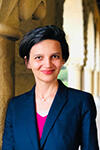Luciana Sanga
Luciana Sanga studies modern and contemporary Japanese fiction, with a focus on popular literature, genre, and gender studies. Her work has appeared in the U.S. Japan-Women’s Journal, Japanese Language and Literature, Review of Japanese Culture and Society and Proceedings for the Association of Japanese Literary Studies. She is currently completing her book manuscript of the genre of love novels in Japan.
Luciana holds a Ph.D. in Japanese literature from Stanford University and a B.A. in history from the University of Tokyo.
Before coming to Yale, she taught Japanese literature and language at Northwestern University and was a visiting research scholar at the Reischauer Institute of Japanese Studies at Harvard University. At Yale she teaches classes on Japanese literature.
Selected publications:
Tanabe Seiko, Feminism, and the Making of a Love Novel | Japanese Language and Literature (pitt.edu)
https://guides.nccjapan.org/homepage/news/news/Japanese-Studies-Spotlight-Fuzoku-zasshi
Courses
EAST 410, EALL 234
Japanese Detective Fiction
This class offers an overview of modern Japanese literature with a focus on detective fiction. Through detective fiction we can examine key concepts in literature such as narrative voice, point of view, genre, modernism and postmodernism, and learn about debates in Japanese literature, the distinction between highbrow and popular fiction, and the relation between Japanese literature and translated fiction. Detective fiction also allows for the exploration of key issues in Japanese history and society such as consumerism, colonialism, class, gender, and sexuality. Readings include a wide range of texts by canonical and popular writers, as well as theoretical texts on genre and detective fiction.

